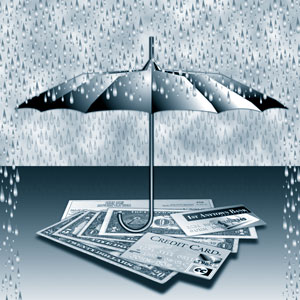
|
FDIC Consumer News
Important Update: FDIC Insurance Coverage Increased in Late 2008
In the fall of 2008, Congress temporarily increased the basic FDIC insurance coverage limit from $100,000 to $250,000 through December 31, 2009. In addition, the FDIC simplified the rules for the calculation of deposit insurance coverage for revocable trust deposits, including an expanded definition of the "eligible beneficiaries" for additional insurance coverage. As a result, certain previously published information related to FDIC insurance may not reflect the current insurance coverage. For more information, go to www.fdic.gov/deposit/deposits/index.html or call toll-free 1-877-ASK-FDIC (1-877-275-3342) Monday through Friday, 8:00 a.m. to 8:00 p.m., Eastern Time. For the hearing-impaired, the number is 1-800-925-4618.
|
Special 10th Anniversary Edition - Fall 2003
 Weathering a Financial Storm
Weathering a Financial Storm
Income down? Expenses and stress level up? When the going gets tough, here's how the tough can keep going.
Millions of Americans face financial problems that can start with the loss of a job, a death or illness in the family, a divorce or separation, an inability to control spending and borrowing, or a slowing economy. What can you do to protect yourself and your family if you're having financial troubles... or if you simply want to be better prepared financially?
Review your spending.
Your family's welfare comes first, so continue the payments on your home, utilities and insurance, and make sure you have enough insurance (life, health, disability). Consider cutting back on restaurant meals, costly entertainment and other expenses you really don't need.
Be smart about borrowing.
Interest payments on credit cards and other loans are an expense, so think about keeping these and other borrowing costs down.
Commit to a savings program.
If you reduce outlays, you should have more money available to build an emergency savings fund. Many experts say you should build a rainy-day fund equal to three to six months of living expenses to get you through a difficult period without needing a loan or borrowing from your retirement savings.
If you think you've got a serious debt problem, address it immediately. Many people may need to turn to others for assistance, such as a knowledgeable friend or relative, or a reputable credit counseling service.
Beware of scams.
Examples: Bogus offers of "easy credit" and "guaranteed loans" for people with credit problems. The swindlers collect money up-front in exchange for nothing at all, for credit cards or loans that have big strings attached, or for basic services you could do on your own. Promises to erase a bad credit history for a fee also are scams. A bad credit history can only be repaired by steady and consistent on-time payments.
Excerpted from "Weathering a Financial Storm," Winter 2001/02.
|
 Weathering a Financial Storm
Weathering a Financial Storm